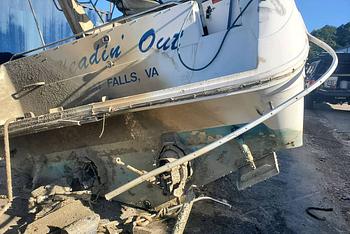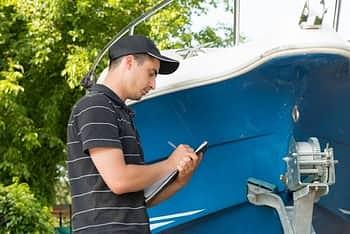Is a used boat survey worth the time and expense? It’s a valid question that many people ask when considering buying a used boat. After all, buying a boat can be an expensive, time-consuming undertaking, and if you can save time or money during the process, it’s a bonus. But do you need to lay out the extra money for a marine survey before signing on the dotted line? The answer is likely a yes, unless it’s a smaller, simpler, less expensive boat, and you judge that the risk factor of uncovering a significant problem after purchase is relatively low. Let’s walk through these questions to help you consider whether a boat survey may be essential in your case:
Unless you're buying a smaller, simpler, and less expensive boat with a low risk of hidden issues, paying for a marine survey before purchase is a wise investment.
What is a Boat Survey?
A boat survey is often referred to as a pre-purchase boat survey, but it has other names, too, depending on the reason for the survey. In all cases, a professional marine surveyor gives the boat a thorough inspection and writes a report detailing areas where there may be faults or damage, although some surveys as we’ll see are more thorough than others.
Surveys aren’t limited to specific expensive yachts and superyachts. A prospective owner of all variety of used boats–and indeed new boats that may have been sitting in a yard for a long time–will benefit from having a survey carried out.
Types of Boat Survey
There are several types of boat survey, including:
Insurance survey
This tends to be the most basic of the surveys. It’s a general overview of the value and/or condition of the boat required by an insurance company before they will offer coverage for the vessel. Do you need a boat survey for insurance? In most cases for used boats if you want to insure the boat itself (as opposed to getting liability insurance), the answer will be yes.
Finance survey
This is similar to the insurance survey. Marine mortgage lenders or finance institutions will usually ask for a survey to be completed before signing off on finance to ensure that what is essentially their asset (or partly their asset) is a good one.
Pre- or post-transport survey
This assesses the condition of a boat before or after being transported and is again used for insurance purposes.
Full condition survey
Also referred to as a pre-purchase survey when a purchase and sale is contemplated, this is the most comprehensive survey and will dig deeper into the condition of the boat, checking everything from the structural integrity of the hull to the electronics, safety systems, interior cosmetics and more. While all boats will have different requirements, essentially a full condition survey will look at the hull, transom, engine, mechanical and propulsion gear, communications equipment, fittings, and electronics. The surveyor will look for cracks, osmosis, signs of accidents, and water damage, as well as general condition, age-related wear and tear, connections, and deck fixtures.
See the article: Types Marine Surveys: Pre-Purchase, Condition and Damage

Whether buying a used boat or a new one that's been sitting in a yard, a marine survey is beneficial for any prospective owner.
Who Pays for a Boat Survey?
The buyer is responsible for paying for a marine survey, as they are the ones undertaking the risk of purchasing a used boat. Whether or not the boat is bought via a broker, there is unlikely to be recourse if, after purchase, issues are found with the boat. It is the responsibility of the purchaser to bediligent and have their prospective purchase thoroughly checked.
Another point worth noting is that if you, the buyer, organize and pay for the surveyor yourself, you know they are impartial. Be wary of a seller offering to pay for a marine survey with a surveyor of their choosing (read our guide Buying a Used Boat From a Private Party).
Why Do I Need a Marine Survey?
Outside of insurance or finance lenders requesting a survey, you should be getting a marine survey to ensure that your asset is a good one. Whatever budget you have for a boat will likely be somewhat proportional to your income, and the last thing you want is to buy a boat that costs you far more than it’s worth, or is worth less than what you will have to invest into it.
A marine survey will flag problems there may be with a boat, but also let you know about all the things that are good with it. Far from a report of doom and gloom, it should ultimately ensure you feel reassured and prepared to take the final step to purchasing, or to feel justified and relieved in walking away from something that didn’t feel quite right.
Can I Negotiate the Sale Price After a Survey?
Once you have your report in your hand, take your time reading through it and don’t be shy about asking about anything you’re unsure of with the surveyor. Remember that the survey is written for you! Armed with the recommendations and status report, you may want to use it to negotiate a better price or ask for certain work to be carried out before purchasing. Be sure to get accurate estimates for the work that needs doing before negotiating the price. While it might seem like you can grab a bargain if the seller is willing to drop the price considerably, you need to keep in mind the work that requires doing both in terms of time and cost. Check out our guide to Buying a Cheap Boat, Is it a Good Idea?

The survey report can help you negotiate a better price or request repairs before purchase. Make sure you have accurate estimates for any needed work.
How Do I Choose a Marine Surveyor?
If you’re going to spend money getting a marine survey, then you want to ensure you’re getting good service and a thorough report by an experienced surveyor who subscribes to a clear code of ethics (the latter are typically subscribed to by surveyors associations (see below)). Again, it’s always best to use a surveyor who you find yourself or are recommended by a trusted friend as opposed to one recommended by a broker or the seller. While their intentions are typically good, gaining an unbiased, objective report is paramount.
When choosing a surveyor, ask the following questions:
Are they registered with an official surveying organization that regulates its members? In the U.S., the Society of Accredited Marine Surveyors (SAMS) and the National Association of Marine Surveyors (NAMS) are the two main organizations. In the UK, these include the Yacht Designers & Surveyors Association in the UK and the International Institute of Marine Surveying. These organizations provide specific accreditations and have lists of members in different regions, so they are a good place to start looking.
Do they have specific experience in surveying the size, style, and construction of the boat you are considering buying? There are specialist surveyors in sail boats, wooden boats, sports boats, etc. Each surveyor typically has specific previous experience you can ask about, perhaps as a yacht captain or in the military.
Do they produce clear reports? Ask to see a sample report to see the layout, detail, and wording they use before deciding if it is right for you. You want a clear report that offers definitive recommendations or opinions.
What do they charge? Be sure to get official quotes as well as their terms and conditions before agreeing to a marine survey. You also want to ensure that they carry indemnity insurance.
Do I Need to Be Present for the Marine Survey?
You don’t have to be present for the survey, but it is a good idea to be present if possible. You will learn a lot about the boat you’re buying as you watch the surveyor work, and they can show you things as they discover them, which is easier and more informative than only reading about it in the report later.
We know that finding the right boat can seem a daunting task. But armed with a library of practical information (see our blog), advisors on hand to talk you through the process, and of course thousands of boats for sale all over the world, Rightboat.com will ensure you find the right boat for you.
This article was published in January 2022 and updated in July 2024 by John Burhnam



